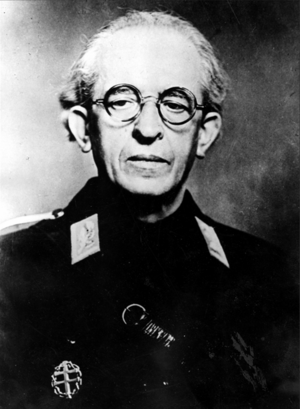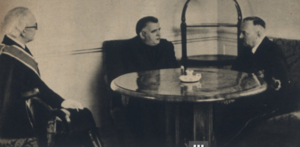Vojtech Tuka facts for kids
Quick facts for kids
Vojtech Tuka
|
|
|---|---|

Vojtech Tuka in October 1939
|
|
| Prime Minister of Slovakia | |
| In office 26 October 1939 – 5 September 1944 |
|
| President | Jozef Tiso |
| Preceded by | Jozef Tiso |
| Succeeded by | Štefan Tiso |
| Minister of Foreign Affairs | |
| In office 26 October 1939 – 2 September 1944 |
|
| Preceded by | Ferdinand Ďurčanský |
| Deputy, Czechoslovak Parliament | |
| In office 1925–1929 |
|
| Personal details | |
| Born | 4 July 1880 Hegybánya, Kingdom of Hungary (now Štiavnické Bane, Slovakia) |
| Died | 20 August 1946 (aged 66) Bratislava, Czechoslovakia (now Bratislava, Slovakia) |
| Cause of death | Execution by hanging |
| Nationality | Slovak |
| Political party | Slovak People's Party |
| Occupation | Politician, lawyer, professor, editor |
| Profession | Law |
Vojtech Tuka (born July 4, 1880 – died August 20, 1946) was an important Slovak politician. He served as the prime minister and foreign minister of the First Slovak Republic from 1939 to 1945. Tuka played a major role in the forced removal of Slovak Jewish people to Nazi camps in German-controlled Poland. He was a leader of a strong group within the Slovak People's Party.
Contents
Early Life and Education
Vojtech Tuka was born in a place called Hegybánya, which is now Štiavnické Bane, Slovakia. He also went by the Hungarian name Béla. He studied law at universities in big cities like Budapest, Berlin, and Paris.
He became the youngest professor in the Kingdom of Hungary. He taught law first in Pécs and then in Bratislava from 1914 to 1919. After his university closed in 1919, he worked as an editor in Bratislava.
Becoming a Politician
After Czechoslovakia was formed in late 1918, Tuka joined the Slovak People's Party. This party wanted more independence for Slovakia. This desire for independence helped Tuka become more powerful. In 1923, he started an armed group called Rodobrana, which means "Home Guard." Tuka also served as a representative in the Czechoslovak parliament.
Political Trouble and Imprisonment
In 1928, Tuka wrote an article called "Vacuum Juris." In it, he claimed there was a secret agreement from 1918. He said this agreement meant Slovakia's official link to Czechoslovakia would only last ten years. According to Tuka, after October 30, 1928, Czechoslovakia would no longer have power in Slovakia.
The government in Prague accused Tuka of serious crimes against the state. Tuka was found guilty and sent to prison for 15 years. He stayed in prison for about ten years.
Rise to Power in the Slovak Republic
In March 1939, Czech troops moved into Slovakia. This happened because some Slovak leaders, including Tuka (who had recently been released from prison), were strongly calling for independence. On March 13, Adolf Hitler used this situation to his advantage. He encouraged Jozef Tiso, who was a Slovak ex-prime minister and a Catholic priest, to declare Slovak independence. This happened on March 14. The Czech part of Czechoslovakia then became part of Nazi Germany.
Tiso became the Prime Minister of the new Slovak state on March 14, 1939. He was later chosen as President on October 26, 1939. Right away, Tiso appointed Vojtech Tuka as his Prime Minister.
In July 1940, a meeting called the Salzburg Conference took place in Salzburg, Austria. This meeting led to Slovakia working much more closely with Germany. As a result, Tuka and other leaders gained more power. Tuka attended this meeting, along with Hitler, Tiso, and other important figures. The agreement from this meeting pushed for faster anti-Jewish policies in Slovakia.
Laws Against Jewish People
On September 3, 1940, Tuka led the Slovak Assembly to pass a new law. This law allowed the government to remove Jewish people from the country's economy and social life. Earlier laws had already taken away their right to take part in politics. On November 24, Tuka and Germany's foreign minister signed an agreement. This agreement made Slovakia an ally of Germany, Japan, and Italy.
In 1940, a German officer named Dieter Wisliceny was sent to Bratislava. His job was to advise Tuka's government on "Jewish affairs." With Wisliceny, Tuka created a very strict set of rules called the Judenkodex (Jewish Code). This code was put into effect on September 9, 1941. It had 270 articles that took away almost all rights from Slovak Jewish people. This code was even longer than the Slovak Constitution. It forced Jewish people to wear a yellow star, canceled all debts owed to them, took away their property, and made them leave Bratislava.
Slovakia was the first country not directly controlled by Germany to agree to send its Jewish citizens away.
In 1942, Tuka strongly supported sending Slovakia's Jewish population to the Nazi camps in the east. Tuka, along with the Interior Minister Alexander Mach, pushed for the Slovak People's Party to work even more closely with Germany. This was supported by the Hlinka Guard, a group that Tuka had helped revive.
The Slovak government agreed to pay Germany 500 Reichsmark for each Jewish person deported. President Tiso knew about these deportations that Tuka was organizing. In 1942, Tiso gave a speech where he defended the ongoing deportations of Slovak Jews.
The forced removal of Slovak Jews was stopped in October 1942. Many reasons have been suggested for this decision, including pressure from Slovak religious leaders. Between March 25 and October 20, 1942, Slovakia sent about 57,700 Jewish people to Nazi camps. However, in September 1944, the deportations started again. By the end of the war in April 1945, about 13,500 more Jewish people were deported.
End of His Political Career
By 1943, Tuka's health was getting worse, and he was doing less political work. In early 1944, he started planning to step down from his position. After many discussions about who would replace him, he resigned on September 5, 1944. This happened a few days after the Slovak National Uprising began. Because he was prime minister, his resignation meant the whole government had to resign too. Štefan Tiso, a distant relative of President Jozef Tiso, took over as prime minister. After this, Vojtech Tuka no longer took part in Slovak politics.
At the end of World War II, Tuka had a stroke and was in a wheelchair. He moved to Austria with his wife and caregivers. There, he was arrested by Allied troops and given to the new government of Czechoslovakia. After a short trial, Vojtech Tuka was put to death on August 20, 1946.
Swiss Bank Account
In 1997, Slovak Jewish leaders asked the Czech government to return property that belonged to Slovak victims of the Holocaust. That same month, a list of old Swiss bank accounts from World War II was published. This list included Vojtech Tuka's name.
Some people, like Simon Wiesenthal, suggested that the money in Tuka's account should go to a fund for victims of the Nazis. However, others debated what should happen to the money. A Slovak historian named Ivan Kamenec noted that Tuka held many important jobs that paid very well. He said that Tuka's living costs were not high, so he likely had savings.
See also
 In Spanish: Vojtech Tuka para niños
In Spanish: Vojtech Tuka para niños
 | James Van Der Zee |
 | Alma Thomas |
 | Ellis Wilson |
 | Margaret Taylor-Burroughs |


